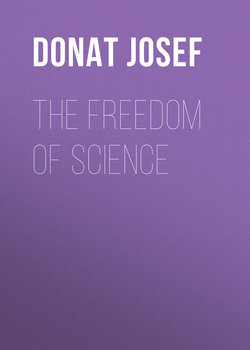Читать книгу The Freedom of Science - Donat Josef - Страница 7
First Section. The Freedom of Science and its Philosophical Basis
Chapter II. Two Views Of The World And Their Freedom
The Christian View of the World and its Freedom
ОглавлениеOn the one hand there is the Christian view of the world: it is essentially also the one which appears self-evident to every unbiassed mind. In this view man is a creature, limited in every way, therefore in many ways dependent upon external rules, forces, and authorities. To God alone is it reserved to be infinite, and, therefore, to possess in Himself all perfection, goodness, and truth; for which reason there is nothing above Him on which He could be dependent. This is not the case with man. As a creature man is subject to his Creator. The latter is master over man's life and therefore at the same time its ultimate aim. For this reason religion is of obligation to man, that is, he must honour God as He demands it; if God requires faith in a revelation, if He established a Church and duly authorized it to guide us, we must submit to it. In the same way the intellect of man is bound by the laws of objective truth, which is not of his making, but presents itself to him as a norm: he must always be subject to it whether he wishes or not. Man is, finally, a factor in social life; he lives in the family, state, and Church, in the great society of mankind; upon them he is dependent for his education and development. And society requires that man be subject to a ruling authority, that in many things his own interests be subordinated to the welfare of the community.
This is the order that God has established and wishes observed. Hence all human authority is a participation in God's supreme government. Thus it comes about that limits may be set to the scientist's free expression of his views, if the interest of the community require it.
Man is, nevertheless, free. But his freedom does not mean complete independence; nor freedom from all restraint, but only from those external restraints which are opposed to his nature and position, which hinder his legitimate development and activity. He possesses freedom, but only such a freedom as is his due, by which he can unfold and develop his physical and mental powers. To keep his place of subordination to, and dependence on, these higher authorities and powers of truth and order, tends not to injure but to improve his being, not to dwarf but to develop his personality; for they are sources of life to him, they impart to his existence order and harmony, they raise him above himself and his own littleness, they free him from the prison of his own narrowness and selfishness, from the chains of his unruly desires. If a man emancipates himself from these bonds, which he ought to bear, he has freedom of course, but an unnatural freedom, which will be harmful and perhaps ruinous to him.
Take the tree, for instance. It should have freedom for its natural growth. If you force it to creep along the ground instead of growing upward, if you deny it air and light, you infringe on the freedom it should have. Still it cannot have absolute freedom, for it is dependent on the ground from which it derives its nourishment, dependent on the laws of light and atmosphere and gravitation, on the laws of season; it must adapt itself to climate and soil. It may not say to the light: Away with you! – a stunted growth and deformity would be the result of such emancipation. It may not say to the ground: Away with you! – a sad but quick death would be its fate. It has its freedom, and in this freedom it grows and thrives. If it desires greater freedom, it would be an unnatural one, and it would tend, not to its development, but to its destruction.
Such is the Christian view of man and his thought. Here, then, there is but one question to solve: Are the external restraints imposed on me in my investigation and teaching against my nature; against the right of my mind to truth; against my position in human society? If so, then I reject them, because they mean serfdom, not duty; unjust bonds, not natural restraint. But if not, then I do not refuse them my submission. Freedom I want, but only the freedom of man.
Here we pause. Suffice it at present to have formulated the question; we shall return to this topic later and discuss it at greater length.
